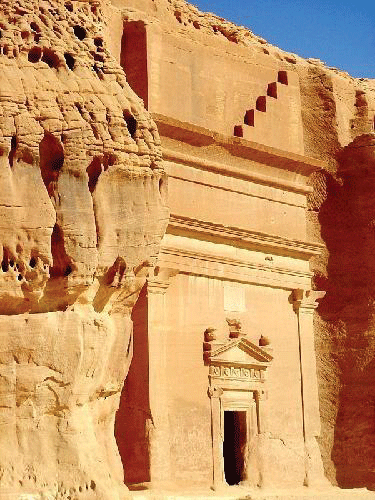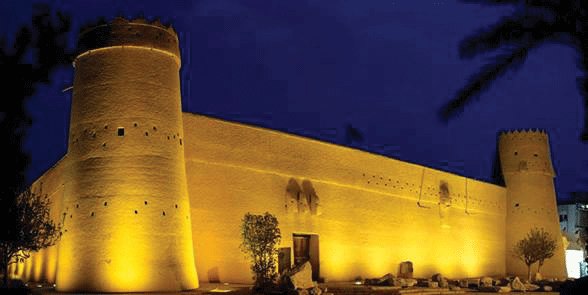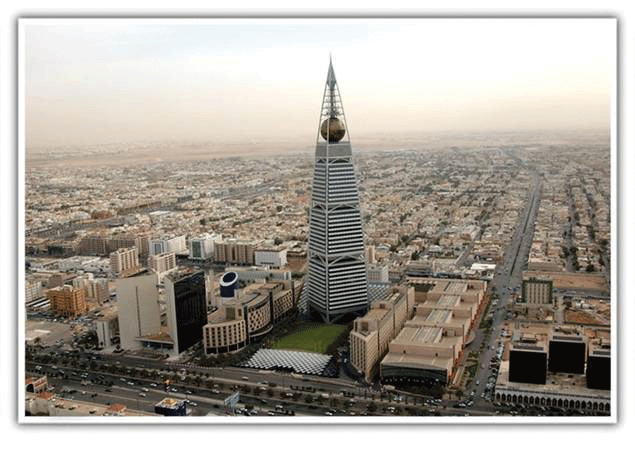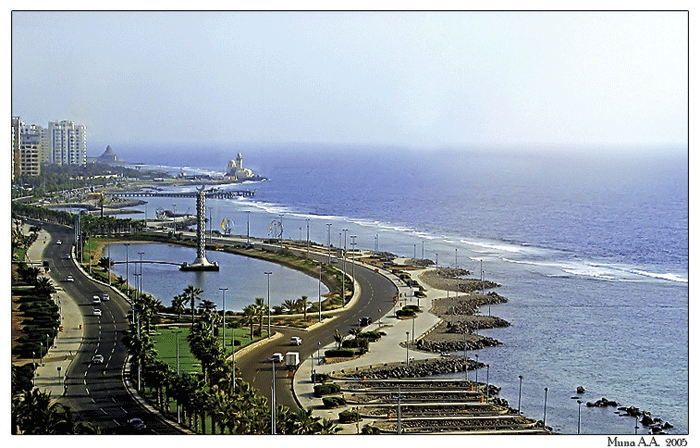SAUDI ARABIA
Saudi Arabia: A nation on the move.Saudi Arabia long been recognized
as powerhouse of the Middle East
Saudi Arabia has long been recognized as a powerhouse of the Middle East. Now it’s poised to become one of the world’s top 10 most competitive nations and with that, one of the most lucrative markets for strategic investment.
Since it was founded by His Majesty King Abdul-Aziz bin Abdurrahman Al-Saud, the Kingdom of Saudi Arabia has made remarkable achievements in all areas of development; economic, social, political and cultural. The robust and consistent base provided by his Majesty served as a starting point for the development process and ensured continuity for more than a century, leading to a comprehensive development renaissance that has contributed to upgrading economic growth, raising living standards, improving quality of life, and providing work opportunities for citizens. These advances have been based on quantitative expansion and qualitative enhancement of educational services, training, healthcare, social services, infrastructure, communications, and municipal services; all within the framework of a genuine partnership between the public and private sectors working together for the delivery of programs and plans, designed to effect balanced and sustainable development across the regions.

Background
Saudi Arabia is the birthplace of Islam and home to Islam's two holiest shrines in Mecca and Medina. The king's official title is the Custodian of the Two Holy Mosques. The modern Saudi state was founded in 1932 by ABD AL-AZIZ bin Abd al-Rahman AL SAUD (Ibn Saud) after a 30-year campaign to unify most of the Arabian Peninsula. Custodian of the Two Holy Mosques Abdullah Bin Abdul Aziz was proclaimed the sixth King of the Kingdom of Saudi Arabia on the first day of August 2005. King Abdullah instituted an Inter-Faith Dialogue initiative in 2008 to encourage religious tolerance on a global level; in February 2009, His Excellency Abdullah reshuffled the cabinet, which led to more moderates holding ministerial and judicial positions, and appointed the first female to the cabinet. The country remains a leading producer of oil and natural gas and holds more than 20% of the world's proven oil reserves. The government continues to pursue economic reform and diversification, particularly since Saudi Arabia's accession to the WTO in December 2005, and promotes foreign investment in the kingdom. The Kingdom of Saudi Arabia is also a member of G20.
Saudi Arabia offers a dynamic and robust economy, perfect for
serving the world’s most demanding markets.
Dynamism and growth
The performances of both Saudi Arabia and MENA’s economies have exceeded world growth. Meanwhile, Saudi’s non-oil sector has delivered accelerating growth rates as the economy diversifies.
Encouraged by robust GDP growth and macroeconomic stability, consumer confidence is well above the regional average. Growing private credit and increased public expenditures on infrastructure and other projects provide a broad basis for robust opportunities across the Middle East, but in Saudi Arabia these are translating into particularly strong and sustained growth in domestic demand, KSA itself has never been more committed to supporting economic growth. Robust growth in government revenues is supporting double-digit increases in government expenditures on social, infrastructure, and other investment projects. Perhaps even more crucial in the long term, an increasingly deregulated and competitive economic environment is supporting an explosion of business formation as the private sector takes an increasingly prominent role in the economy.
Foreign investment
The variety of domestic and export-oriented investment opportunities in Saudi Arabia has attracted steadily increasing foreign direct investment as the economy has been progressively opened. Saudi Arabia’s rapid improvements have made the country an increasingly attractive destination for investment. The World Investment Report measured Saudi Arabia’s FDI inflows to be the 12th largest in the world and the highest amount in the MENA region.
Economic stability
Sound macroeconomic management and an inflection point in world energy markets have made the KSA’s economy stable, despite the global financial crisis. While much of the world economy has recently been affected by a global liquidity squeeze, Saudi Arabia’s twin surpluses in the government budget and current account have made KSA an attractive, high-liquidity environment for local and foreign ventures.
Market size
As the region’s largest economy and the world’s 19th largest, the sheer size of the markets that Saudi-based projects serve is “a competitive advantage, allowing Saudi businesses to benefit from economies of scale.” With excellent access to Saudi and other MENA markets, as well as the advanced and emerging economies of nearby Europe and Asia, market exposure for Saudi-based projects is not only vast but also highly diversified.
Cluster development
Investors in Saudi Arabia enjoy increasingly well-developed business clusters and value chains that set the nation apart from its neighbors and from other emerging economies. The World Economic Forum ranks the Kingdom 26th for both Value Chain Breadth and Production Process Sophistication.
Well established, competitive and efficient, Saudi Arabia’s domestic industries-from energy and chemicals to transportation-provide industrial projects with exceptional opportunities for cost savings.
The Kingdom of Saudi Arabia is undergoing an exciting transformation. One of the most enterprising nations in the Middle East, Saudi’s vast natural energy combined with the long-term vision and strategic planning of its rulers has helped to create today’s stable, robust economy. Now, Saudi is looking to the future with an ambitious program of accelerated growth and development that will position it firmly as a new global force.
To capitalize on these geographic advantages, Saudi has set itself three strategic targets:
-To become the global capital of energy. Up and downstream petrochemicals, minerals, power and water are all vital to the Saudi and global economy.
-To act as a transport and logistical hub between east and west. KSA’s roads, railways and air links create a potential consumer base of more than 250 million, all within 3 hours’ reach.
-To transform its knowledge- based industries, healthcare, life science, education and IT. These industries are all crucial drivers of long-term, sustainable change.

Building a nation of sustainable prosperity
KSA is a nation that is looking to and preparing for, a different kind of future, a future that’s more inclusive, expansive, sustainable and integrated on both economic and social levels; a future that revolves around investment. New communications infrastructures, new transport routes, state of the art industrial complexes, dynamic training opportunities and a commitment to greater business efficiencies - all of these things and many more will be delivered through Saudi’s focused investment, helping to build a nation of sustainable prosperity.
The Kingdom is investing massively to enhance its value proposition to foreign businesses, both with infrastructure and with reform. His Majesty King Abdullah bin AbdulAziz Al Saud, Custodian of the Two Holy Mosques, has directed the Saudi government to become one of the world’s Top 10 most competitive economies . In pursuit of this goal, the organs of government have initiated a multi-faceted reform strategy that has made the Kingdom one of the easiest places in the world to do business.
The region’s largest market is embarking on a historic
ICT investment program that will make the
KSA a regional technology landmark.
With over 27 million consumers and a number of global enterprises, Saudi Arabia is the largest ICT market by far in the Middle East. For example, the Saudi Arabian telecommunications and information technology industries represent over 55% and 51% of the total Middle East markets, respectively.
Yet, while many of the world’s ICT markets are maturing, the Saudi Arabian market remains substantially under-developed by global standards and remains on a rapid growth trajectory. ICT spending has grown at over 10% per year since 2001 to reach US$7.3 billion in 2006. Liberalization is occurring across the telecom industry, driving increases in competition, service levels, and usage. Numerous Saudi Arabian IT industries show clear signs of rapid growth, driven by the committed presence of major multinationals, and by the expanding skills and confidence of local companies.
A large, emerging market
The size of the Saudi Arabian ICT market provides excellent operational scale, as well as the advantages of locating in a technology hub catering to over 350 million Arabic-speakers in the region. Because Saudi society is young and growing rapidly, its consumer market is weighted heavily towards technologically literate early adopters. Arabization (digital content, software) activities enjoy strong growth prospects due to this large emerging market and the increasing supply of qualified software engineers coming available due to public and private training initiatives.

Leaders in connectivity and ICT
ICT adoption is also increasing rapidly thanks to rising personal wealth and an unprecedented commitment on the part of the public sector to achieving leadership in connectivity and information technology. Saudi Arabia has embarked on a twenty-year ICT plan that will support widespread technology and telecommunications adoption across KSA’s households and enterprises. A combination of deregulation and substantial public investments will create attractive investment opportunities for the private sector. Recent examples of such participation include a US$100 million investment by a venture capital firm in Saudi-based technology companies.
State of the art communications infrastructure
KSA’s unique access to energy makes it an attractive location for a range of activities across the ICT value chain. For example, ICT-enabled services providers (such as data centers) will be able to leverage Saudi Arabia’s unique access to low-cost power and state-of-the-art communications infrastructure to efficiently service global customers. Equipment and component production are also highly energy-intensive and require significant use of petroleum derivatives such as chemicals and plastics. Combined with KSA’s attractive setup incentives, these advantages translate into considerable cost savings for hardware manufacturing and assembly activities.
Meanwhile, software and other content providers enjoy a secure environment for commercialization, thanks to significant progress on intellectual property rights (IPR) laws by the Ministry of Commerce and the CITC.

Good reasons to invest
Saudi Arabia is the region’s largest ICT market with strong growth in consumer and enterprise and markets.
Deregulation, privatization and WTO accession promoting private-sector opportunities-supported by significant investment incentives.
Public-private funding partnerships such as KACST’s R&D co-funding initiatives by KACST.
Public-private partnerships supporting venture capital funding such as recent collaboration between SAGIA and Intel
Strong commitment to e-commerce and e-governance initiatives (including IP protection).
Significant unmet demands for web-based and mobile services; increased enterprise and government usage of web-based services provide large-scale opportunities for contractors and service providers
Massive public investment in connectivity for Economic Cities provides unique opportunities for green-field projects covering millions of users
Public investment in computer and Internet literacy programs. k

